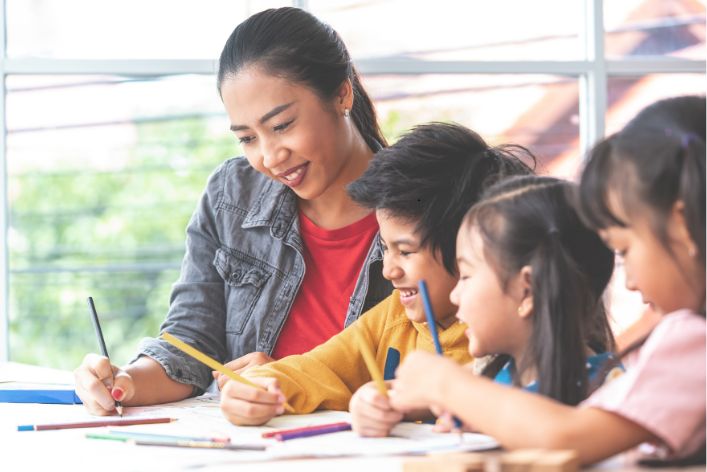Teachers are crucial in modern education, particularly with changing student needs.
In today’s fast-paced and constantly evolving world, the concept of education has also undergone a significant transformation.
New technologies, changing student demographics, and an emphasis on developing soft skills have shifted our approach to education.
In this modern landscape, the role of teachers has become more important than ever before.
Teachers impart knowledge to students and adapt to changing student needs.
This article explores the evolving role of teachers in modern education.
It discusses strategies teachers can use to meet changing student needs.
We also examine the importance of ongoing professional development for teachers.
This impacts student learning outcomes.
Ultimately, this article aims to highlight the critical role that teachers play in shaping the future of education.
We will also discuss how they can effectively adapt to the changing needs of their students.
The Changing Landscape of Modern Education
Technological advancements, changing student demographics, and an increased emphasis on soft skills rapidly change modern education.
These changes are impacting the way education is delivered and the role of teachers in the process.
Firstly, technology has revolutionized education by providing access to new learning resources, tools, and platforms.
Digital learning has become popular. Integrating technology in classrooms allows more personalized and engaging learning experiences for students.
Innovative Tech Solutions, Tailored for You
Our leading tech firm crafts custom software, web & mobile apps, designed with your unique needs in mind. Elevate your business with cutting-edge solutions no one else can offer.
Start NowSecondly, changing student demographics are also influencing modern education.
A diverse student population requires teachers to be adaptable and flexible in their teaching approaches.
The focus of education has shifted due to an emphasis on soft skills like communication, collaboration, critical thinking, and creativity.
Modern education aims to develop a broader range of skills.
This prepares students for future careers and life.
These changes require teachers to be more versatile and responsive to the evolving needs of their students.
As a result, the role of teachers has become more complex and challenging than ever before.
Teachers must be equipped with the necessary skills and knowledge to support student learning and well-being effectively.
Read: Future of Digital Education: Impact of 5G Technology

Adapting to Changing Student Needs
Adapting to changing student needs is a critical aspect of modern education.
Increasing student diversity means teachers must tailor their teaching approaches to each student’s unique needs.
This involves recognizing that students have different learning styles, interests, and backgrounds that can impact their learning experiences.
One effective way to adapt to changing student needs is by personalizing learning.
Personalized learning provides students with individualized support and resources to help them succeed.
This approach can include differentiated instruction, where teachers adjust their teaching to match the learning needs of individual students.
Encouraging student engagement is also essential to adapting to changing student needs.
Engaged students are more likely to be motivated to learn and take an active role in their education.
Teachers can foster engagement by creating a positive, inclusive classroom environment.
They use technology to enhance learning and provide opportunities for student collaboration and communication.
Developing critical thinking skills is another key component of adapting to changing student needs.
Teachers must help students develop critical thinking and problem-solving abilities, given the emphasis on soft skills in modern education.
This can involve using inquiry-based learning approaches that encourage students to ask questions, think critically, and develop their problem-solving skills.
Providing timely feedback is also crucial to adapting to changing student needs.
Effective feedback informs students about their progress, strengths, and areas for improvement.
Seamless API Connectivity for Next-Level Integration
Unlock limitless possibilities by connecting your systems with a custom API built to perform flawlessly. Stand apart with our solutions that others simply can’t offer.
Get StartedThis helps them adjust their learning strategies.
In short, teachers must be flexible, adaptable, and responsive to diverse student needs.
Read: Educational Apps for Personalized Learning Experiences: Best Picks
The Role of Teachers in Supporting Student Well-being
The role of teachers in supporting student well-being is critical in modern education.
Teachers play a vital role in ensuring that students are not only academically successful but also emotionally and mentally healthy.
With increasing attention being paid to the importance of social-emotional learning and mental health, teachers must be equipped with the knowledge and skills to support student well-being effectively.
One important aspect of supporting student well-being is addressing mental health.
Teachers can promote positive mental health by creating a supportive and inclusive classroom environment where students feel safe to share their feelings and concerns.
Teachers can also provide resources and support to help students manage stress and anxiety, such as mindfulness exercises or counseling services.
Social-emotional learning is another critical aspect of supporting student well-being.
Social-emotional learning teaches students the skills they need to manage their emotions, build positive relationships, and make responsible decisions.
Teachers can support social-emotional learning by incorporating it into their daily teaching practice, modeling positive behaviors, and providing opportunities for students to practice and develop these skills.
Addressing diversity and inclusion is also crucial to supporting student well-being.
Teachers must recognize and celebrate the diversity of their students, creating an inclusive classroom environment where all students feel valued and respected.
This can involve incorporating diverse perspectives into the curriculum, addressing issues of bias and discrimination, and providing support to students who may be facing challenges related to their identity.
Finally, creating a safe and supportive classroom environment is essential to supporting student well-being.
Teachers can foster a positive classroom culture by setting clear expectations, building positive relationships with their students, and creating a sense of belonging for all students.
In essence, the role of teachers in supporting student well-being is critical in modern education.
By addressing mental health, promoting social-emotional learning, addressing diversity and inclusion, and creating a safe and supportive classroom environment, teachers can support the holistic well-being of their students and help them to succeed both academically and personally.
Read: How VR is Transforming Online Learning for Students

Professional Development for Teachers
Professional development for teachers is a crucial component of modern education.
It provides teachers with the knowledge, skills, and tools they need to stay up-to-date with the latest teaching practices, technologies, and educational trends.
This helps teachers improve their teaching effectiveness and better meet the evolving needs of their students.
There are several different types of professional development for teachers, including workshops, conferences, online courses, and mentorship programs.
Transform Business with Custom CRM & ERP Solutions
Elevate your operations with a CRM or ERP tailored for you. Let’s build the perfect solution that others can't replicate—crafted to match your business's needs like no other.
Get StartedThese opportunities allow teachers to learn from experts in the field, collaborate with colleagues, and engage in ongoing learning and growth.
Professional development can also take place within schools and districts.
In-school professional development can involve peer coaching and observation, where teachers observe each other’s teaching practices and provide feedback.
It can also include professional learning communities, where teachers work together to explore new teaching strategies, reflect on their practice, and share resources and ideas.
Effective professional development for teachers is essential for improving student outcomes.
It enables teachers to implement new teaching approaches, technologies, and instructional strategies that better meet the needs of their students.
It also provides opportunities for teachers to reflect on their practice, identify areas for improvement, and stay motivated and engaged in their work.
In summary, professional development for teachers is critical in modern education.
It provides them with the knowledge, skills, and tools they need to improve their teaching effectiveness and better meet the evolving needs of their students.
By providing ongoing learning and growth opportunities, schools and districts can support the professional development of their teachers and ultimately improve student outcomes.
Read: AI Tools Revolutionizing Modern Education: Top 10 in 2024
Final Thoughts
In conclusion, the role of teachers in modern education is vital to meeting the changing needs of students.
The evolving landscape of education calls for teachers to be adaptable and equipped with the necessary skills and knowledge to effectively teach and support their students.
To ensure that teachers are adequately prepared to meet the needs of their students, professional development must be prioritized.
It provides opportunities for growth, learning, and development, enabling teachers to stay up-to-date with the latest trends, technologies, and teaching practices.
As such, schools and districts must invest in professional development programs that are tailored to the specific needs of their teachers.
In addition, supporting student well-being should be a crucial aspect of a teacher’s role.
By creating a safe and inclusive environment, teachers can foster the social and emotional well-being of their students, leading to improved academic outcomes and long-term success.
To achieve these goals, it is recommended that schools and districts create a culture of continuous learning and improvement.
We can also provide ongoing support and resources for teachers.
Moreover, encouraging collaboration and professional learning communities is essential.
Recognizing the value of teacher contributions to the educational system is crucial.
Finally, the role of teachers in modern education is significant.
Their adaptability and ongoing professional development are crucial to meeting students’ evolving needs.
Tailored Tech Solutions to Drive Your Business Forward
Maximize your business potential with custom tech strategies. We deliver bespoke solutions that others can’t match, designed to solve your specific challenges with precision and impact.
Contact UsPrioritizing professional development and supporting student well-being ensures teachers have the necessary skills and knowledge.
This also positively impacts their effectiveness and the lives of their students.
Before you go…
Hey, thank you for reading this blog to the end. I hope it was helpful. Let me tell you a little bit about Nicholas Idoko Technologies.
We help businesses and companies build an online presence by developing web, mobile, desktop, and blockchain applications.
We also help aspiring software developers and programmers learn the skills they need to have a successful career.
Take your first step to becoming a programming boss by joining our Learn To Code academy today!
Be sure to contact us if you need more information or have any questions! We are readily available.











